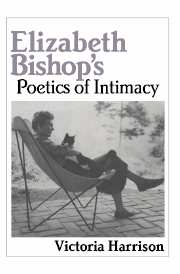1 - Articulating a Personal Poetics
Published online by Cambridge University Press: 07 December 2009
Summary
G.S.: Did it seem important to notice what women poets were doing?
E.B.: No, I never made any distinction; I never make any distinction. However, one thing I should make clear. When I was in college and started publishing, even then, and in the following few years, there were women's anthologies, and all-women issues of magazines, but I always refused to be in them. I didn't think about it very seriously, but I felt it was a lot of nonsense, separating the sexes. I suppose this feeling came from feminist principles, perhaps stronger than I was aware of.
Interview with George Starbuck 322What Bishop does not say in this 1977 interview is that she had, with a few important exceptions, dissociated herself from women's writing, both as an influence and as a movement contemporary with her own poetry. On the one hand, she subscribed to a feminism that maintained, as Louise Bogan put it in a 1963 review of women's poetry: “To separate the work of women writers from the work of men is, naturally, a highly unfeminist action.” Although academic and cultural feminism was in 1977 actively asserting and exploring gender difference, Bishop believed that gender marking (as well as racial marking) contributed to inequality. On the other hand, her refusal to take a stand as a woman writer was consistent with her general privacy regarding most things personal, including, especially, her sexual identity and, until some interviews in the 1960s and 1970s, her political views.
- Type
- Chapter
- Information
- Elizabeth Bishop's Poetics of Intimacy , pp. 19 - 41Publisher: Cambridge University PressPrint publication year: 1993



